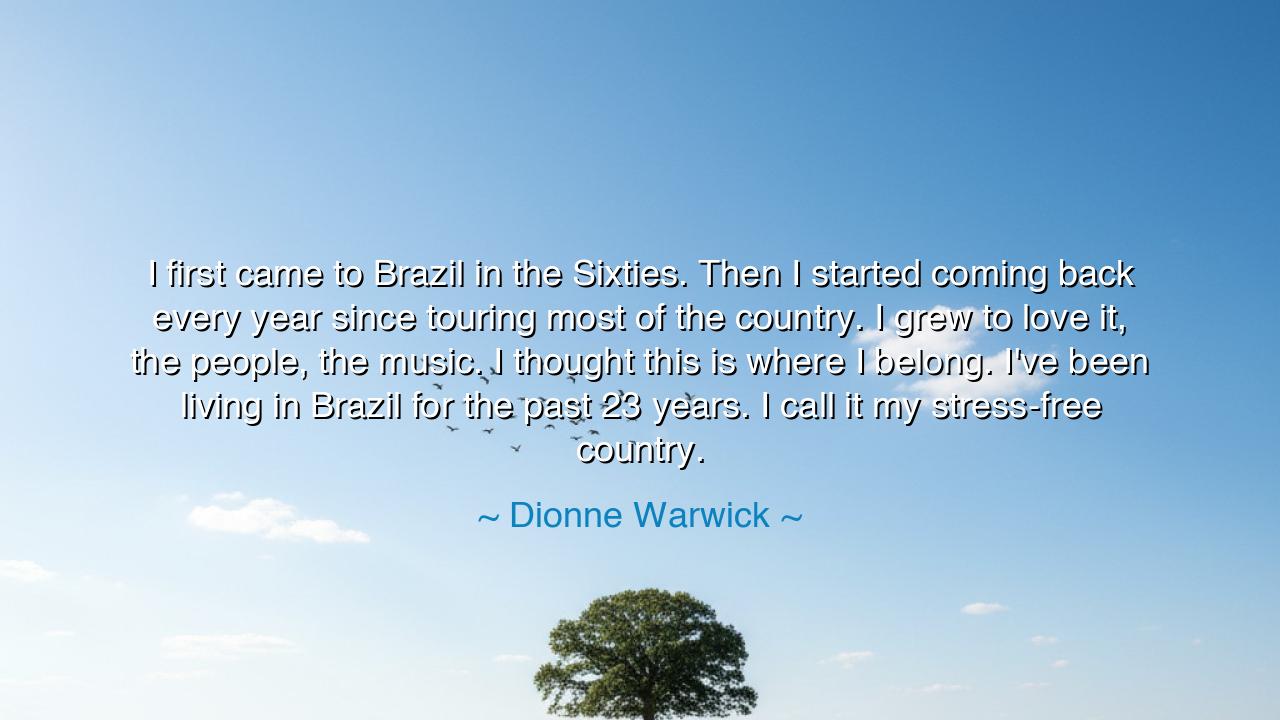
I first came to Brazil in the Sixties. Then I started coming
I first came to Brazil in the Sixties. Then I started coming back every year since touring most of the country. I grew to love it, the people, the music. I thought this is where I belong. I've been living in Brazil for the past 23 years. I call it my stress-free country.






The songstress Dionne Warwick once declared: “I first came to Brazil in the Sixties. Then I started coming back every year since touring most of the country. I grew to love it, the people, the music. I thought this is where I belong. I've been living in Brazil for the past 23 years. I call it my stress-free country.” These words, though simple in their telling, carry the weight of a pilgrim’s discovery. They reveal the eternal yearning of the human heart—to find not only a stage upon which to perform, but a land where the soul may finally rest.
To belong is one of mankind’s deepest desires. It is not enough to achieve glory, nor to gather riches, if the heart remains a wanderer. Warwick, who carried her voice across the world, found in Brazil what many search for all their lives: a home not merely of stone and earth, but of spirit. In the people she met warmth, in the music she found kinship, and in the rhythms of daily life she discovered a peace the world elsewhere could not give. Thus she called it her “stress-free country,” a sanctuary where the burdens of ambition melt into the joy of being.
This is not new wisdom. The ancients told stories of heroes who, after battles and journeys, sought a place of rest. Odysseus longed not only for victory but for Ithaca, his home. The prophets spoke of promised lands where the weary could find peace. Dionne Warwick’s discovery of Brazil is such a tale in modern form: a seeker who roamed the world only to find her heart’s ease in a distant land filled with song and sunshine.
Consider also the story of Paul Gauguin, the painter who abandoned the frenzy of Europe to live among the islands of Tahiti. There, he found release from the cold machinery of his homeland, and his art blossomed in vibrant color and freedom. His tale, like Warwick’s, teaches us that sometimes the soil of our birth is not the soil where our soul can flower. Belonging may be found far from where we began, in lands whose language and customs differ, yet whose spirit harmonizes with our own.
The wisdom here is profound: true peace is not found in fame or in ceaseless striving, but in discovering the place, the people, and the rhythm of life that grant the heart repose. Warwick, though crowned with worldly success, still sought something greater than applause—the embrace of a home that healed rather than demanded. This is why her words carry power: they remind us that to find peace is itself a triumph.
The lesson, children of the future, is this: seek out the place and the company that bring you stillness. Do not be afraid to wander, to test the earth beneath your feet in distant lands, for only in such seeking may you discover where you truly belong. And when you find it, hold it close, for it is rarer than gold and more healing than medicine.
So take this counsel into your lives: listen for the call of your heart. If the land you stand upon wearies you, search for the one that restores you. Cherish the people who lighten your burdens, embrace the music that lifts your spirit, and carve out for yourself a stress-free country, whether it be a nation, a community, or even the quiet refuge of your own inner peace.
Thus remember: life is not only about labor and conquest—it is about finding the soil where your soul can rest and flourish. And when you find such a place, as Dionne Warwick found in Brazil, you will know that you, too, have discovered your true home, your sanctuary, your belonging.






AAdministratorAdministrator
Welcome, honored guests. Please leave a comment, we will respond soon